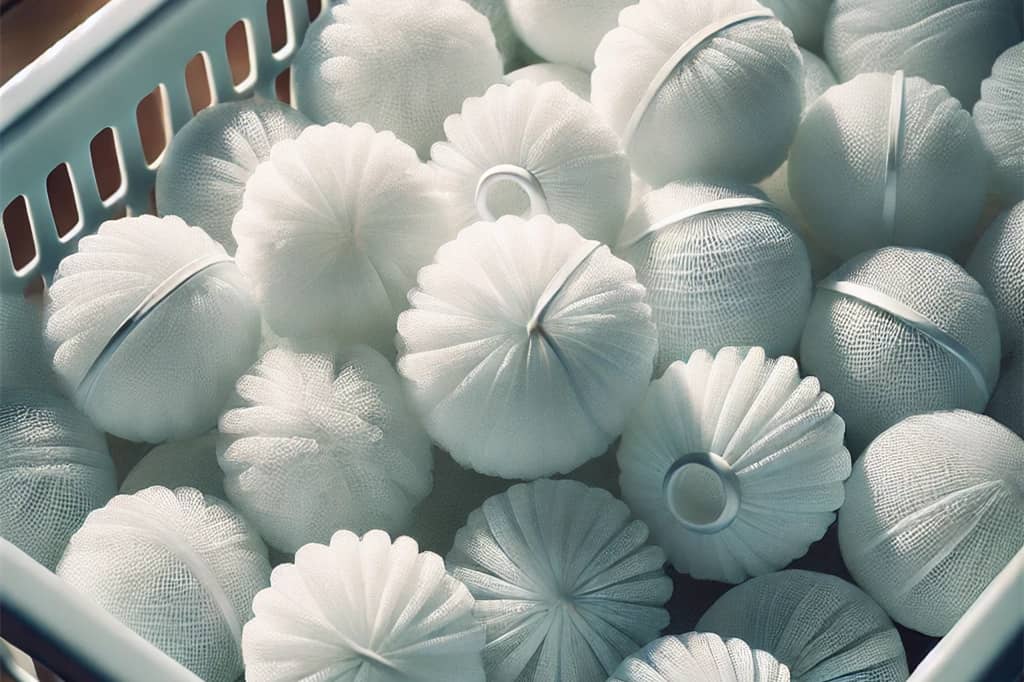If you own a swimming pool, you’ve probably come across the innovative concept of pool filter balls. These tiny, highly efficient filtration media are an eco-friendly alternative to traditional sand, capturing fine debris while enhancing water clarity. But when it comes to maintenance, especially backwashing, many pool owners wonder: can you backwash with pool filter balls? In this article, we’ll learn how pool filter balls work, the best practices for maintaining them, and address some common issues.

What are Pool Filter Balls?
Pool filter balls are lightweight, synthetic balls typically made from a polyester blend. Unlike traditional sand, which is heavy and requires frequent backwashing, filter balls are efficient in capturing debris down to as fine as five microns. A handful of pool filter balls can replace pounds of sand, making them easier to handle, store, and maintain. Not only do they enhance filtration efficiency, but they also reduce the need for frequent backwashing, saving water and energy.
How Do Pool Filter Balls Work?
Filter balls operate similarly to sand by trapping contaminants within their fibers, but they offer finer filtration, resulting in clearer water. These balls allow water to pass through quickly, catching tiny particles that might bypass sand filters. As a result, pool filter balls are often more effective at maintaining water clarity and can be a great option if you’re looking to reduce maintenance time.
Can I Backwash with Pool Filter Balls?
Backwashing is a common pool maintenance process where water is reversed through the filter to flush out accumulated debris. However, backwashing with pool filter balls differs from traditional sand filters. Here’s how it works:
1. Minimal Backwashing Needs:
One of the major benefits of pool filter balls is their efficiency in capturing fine debris without getting clogged quickly. Because they don’t trap particles as densely as sand, they require backwashing less frequently.
2. Gentle Backwashing Recommended:
If you notice reduced water flow, it might be time to backwash. However, a gentle backwash is recommended to avoid dislodging or damaging the filter balls. This process is usually quicker and uses less water than with sand filters.
3. Occasional Cleaning:
Unlike sand, pool filter balls don’t need frequent or intensive backwashing. Instead, you can remove them and rinse them out when necessary. Some pool owners even find it helpful to rinse them in a washing machine, following the manufacturer’s recommendations.
In summary, while you can backwash with pool filter balls, it’s often unnecessary. If you do, a gentle approach will usually suffice.
Benefits of Using Pool Filter Balls
The advantages of switching to pool filter balls are numerous:
1.Reduced Water and Energy Consumption:
With fewer backwashing sessions required, you’ll save water and reduce energy costs over time.
2.Enhanced Filtration:
Pool filter balls are often praised for providing clearer water than sand filters.
3.Lightweight and Easy to Handle:
Replacing filter balls is easier than dealing with heavy bags of sand, making maintenance simpler.
4.Longevity:
High-quality filter balls, like the best pool filter balls, can last multiple seasons with proper care.
Where to Find Pool Filter Balls
Finding pool filter balls near me can be easy as they are now widely available online and in stores that specialize in pool supplies. Many major pool and outdoor retailers stock them, and they’re also available on platforms like Amazon, where you can compare options and prices conveniently. Be sure to check local pool supply shops for pool filter balls near me if you need them quickly or want expert advice in-store.
Common Pool Filter Balls Problems
Although pool filter balls are generally effective and efficient, they do come with some potential drawbacks. Here are a few pool filter balls problems to be aware of:
1. Decreased Water Flow:
Over time, filter balls may start to trap air, which can reduce water flow. This can usually be resolved by periodically removing and rinsing them to ensure they’re free of air pockets.
2. Clogging in Hard Water:
If your pool uses hard water, calcium deposits can build up within the fibers of the filter balls, causing blockages. To prevent this, you may need to clean or replace the filter balls more frequently in hard water conditions.
3. Compatibility with Backwashing Systems:
Some pool owners report that filter balls aren’t as compatible with all backwashing systems, as they don’t always require traditional backwashing. For best results, follow the manufacturer’s instructions for backwashing with your specific filter system.
4. Longevity and Wear:
Lower-quality filter balls may wear out faster, leading to less efficient filtration over time. Opting for the best pool filter balls can help extend the lifespan of your filter media.
5. Initial Cost:
Although the long-term savings on water and energy are notable, the upfront cost of pool filter balls can be higher than sand. Many find this initial investment worthwhile due to the ongoing savings.
Conclusion
In conclusion, pool filter balls offer an efficient, eco-friendly solution for pool filtration, reducing the need for frequent backwashing. While you can perform a gentle backwash if necessary, these filter balls typically require less maintenance than sand filters. By following best practices, choosing the best pool filter balls, and addressing any common pool filter balls problems early, you can enjoy a cleaner pool with fewer maintenance demands.
If you’re looking to simplify your pool maintenance routine, pool filter balls are an option worth considering. Just make sure to follow the manufacturer’s recommendations and enjoy clearer, more eco-friendly pool water.
